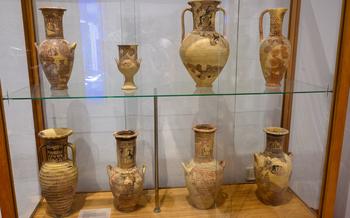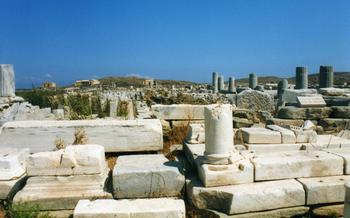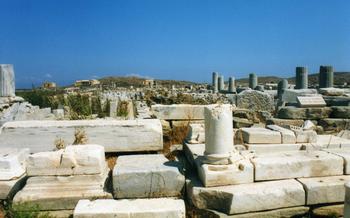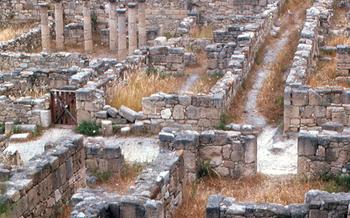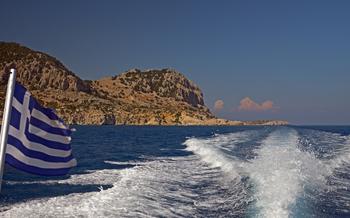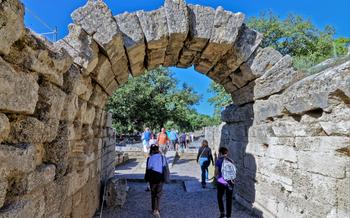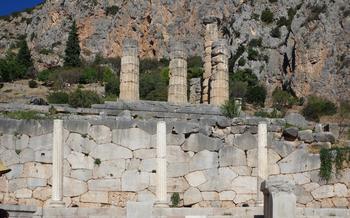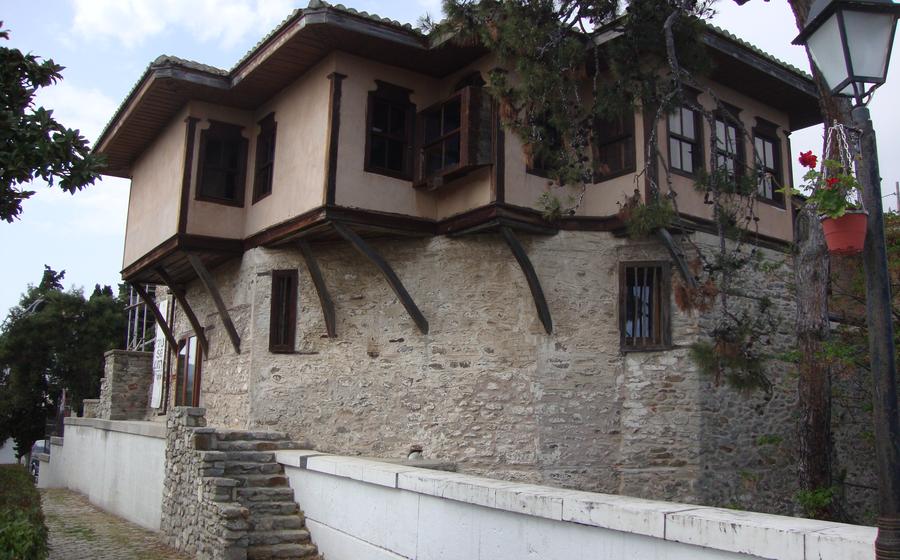
Megalos Prinos Oil Market on Thassos
- A Journey to Thassos' Liquid Gold:
- Historical Significance of Olive Oil in Greece:
- Overview of Thassos' Olive Oil Production:
- Unique Characteristics of Thassos' Olive Oil:
- Geographical Factors Contributing to the Oil's Quality:
- The Heart of Olive Oil Production
- Behind the Scenes: The Olive Oil Journey
- A Culinary Adventure
- Health and Wellness Elixir
- A Touch of History
- Local Traditions and Culture
- Sustainable Practices
- A Feast for the Senses:
- Local Expertise
- Supporting the Local Economy:
- Beyond the Market: Exploring Thassos' Olive Oil Treasures
- Capturing Memories
- Insider Tip:
A Journey to Thassos' Liquid Gold:
In the heart of the Aegean Sea, the island of Thassos proudly holds its title as a land of liquid gold, renowned for its exceptional olive oil production. Olive oil, a cornerstone of Greek culinary heritage and culture, holds a special significance in Thassos' history and economy. Since ancient times, the island's fertile soil and favorable climate have nurtured lush olive groves, yielding a distinctive oil that has captivated gourmands and connoisseurs worldwide. Thassian olive oil, with its unique flavor profile and health-promoting properties, has become an emblem of the island's agricultural prowess and a testament to the deep-rooted connection between the people of Thassos and their land.
Historical Significance of Olive Oil in Greece:
Olive oil has been an integral part of Greek culture and cuisine for millennia. Ancient Greeks revered olive trees as sacred symbols of abundance, wisdom, and peace. Archaeological evidence suggests that olive oil production in Greece dates back to the Bronze Age, with Thassos emerging as a prominent producer in the 6th century BC. Olive oil was not merely a culinary staple; it also held cultural and religious significance, used in religious ceremonies, as a fuel for lamps, and as a valuable trade commodity.
Overview of Thassos' Olive Oil Production:
Thassos' olive oil production boasts a long and storied history, deeply intertwined with the island's geography, climate, and agricultural practices. The island's unique microclimate, characterized by mild temperatures, abundant sunshine, and sea breezes, creates an ideal environment for olive cultivation. Thassos is home to over 5 million olive trees, primarily of the native "Throumpa" variety, renowned for its resilience and adaptability to the island's conditions. Traditional cultivation methods, passed down through generations, ensure that the olives are harvested at their peak ripeness, contributing to the oil's exceptional quality.
Unique Characteristics of Thassos' Olive Oil:
Thassian olive oil stands out for its distinctive flavor profile, characterized by a harmonious blend of bitterness, pungency, and fruity notes. The oil's bitterness, a hallmark of its high polyphenol content, imparts a pleasant peppery sensation, while its pungency adds a touch of spiciness. The fruity notes, reminiscent of ripe olives, almonds, and fresh-cut grass, create a complex and well-rounded flavor profile. These unique characteristics, coupled with the oil's golden-green color and low acidity, have earned Thassian olive oil a reputation for excellence among olive oil connoisseurs.
Geographical Factors Contributing to the Oil's Quality:
The exceptional quality of Thassian olive oil can be attributed to several geographical factors that converge to create ideal conditions for olive cultivation. The island's location in the northern Aegean Sea, surrounded by pristine waters, provides a mild and stable climate. The sea's moderating influence protects the olive groves from extreme temperatures, reducing the risk of frost damage and ensuring a consistent growing season. The island's hilly terrain, with its well-drained soils and ample sunshine, further contributes to the health and productivity of the olive trees. These favorable conditions, combined with the expertise of local olive growers, result in olives that are rich in flavor and produce an oil of exceptional quality.
The Heart of Olive Oil Production
The Megalos Prinos Oil Market stands as the vibrant heart of olive oil production in Thassos. Its history is deeply intertwined with the island's olive oil legacy, dating back to the early 1900s when it was established as a central hub for trading and selling the liquid gold of the island. Over the years, the market has evolved, expanding in size and reputation, becoming a bustling marketplace where visitors can immerse themselves in the world of Thassian olive oil.
The market is strategically located in the picturesque village of Megalos Prinos, surrounded by lush olive groves that blanket the hillsides. Its layout is simple yet efficient, with rows of stalls showcasing a vast array of olive oil products, from freshly pressed extra virgin olive oil to aromatic infused oils and traditional oil-based delicacies. The atmosphere is lively and welcoming, with the air filled with the heady scent of olives and the cheerful chatter of locals and visitors alike.
The Megalos Prinos Oil Market is not just a place of commerce but also a center of social and cultural significance for the island. It serves as a meeting point for olive growers, producers, and enthusiasts, who come together to share knowledge, exchange stories, and celebrate the olive oil tradition that has been passed down through generations.
Behind the Scenes: The Olive Oil Journey
In Thassos, olive oil production is a journey steeped in tradition and innovation. The process begins with the meticulous harvesting of olives, typically by hand to prevent damage to the fruit. The olives are then transported to local mills, where they undergo a series of steps to extract the precious oil.
Traditional methods of oil extraction involved the use of stone mills, which crushed the olives into a paste. This paste was then pressed to separate the oil from the solids. Today, modern mills employ centrifugal machines that efficiently extract the oil while preserving its quality.
Local cooperatives play a vital role in supporting olive growers by providing access to shared facilities, technical expertise, and marketing opportunities. These cooperatives ensure that the oil is produced according to strict quality standards and that the growers receive fair compensation for their efforts.
Thassos is committed to sustainable olive oil production, employing organic and eco-friendly farming practices. Growers minimize the use of chemicals and pesticides, protecting the environment and preserving the natural balance of the olive groves. Sustainable practices also extend to waste management, with initiatives in place to reduce and recycle by-products from the oil production process.
A Culinary Adventure
Thassian olive oil is a culinary treasure that can elevate any dish from ordinary to extraordinary. Its distinct flavor and aroma make it an essential ingredient in traditional Greek cuisine.
At the Megalos Prinos Oil Market, visitors can indulge in a symphony of flavors as they sample the wide variety of olive oil products available. From delicate extra virgin oils to infused oils with unique flavors, there's something to satisfy every palate.
For a truly immersive experience, try your hand at preparing traditional Greek dishes using Thassian olive oil. From classic moussaka to refreshing salads, the oil's rich flavor will add an authentic touch to your culinary creations.
Experiment with different grades and qualities of olive oil to discover the perfect one for your cooking style. Whether you're a seasoned chef or a novice in the kitchen, Thassian olive oil will inspire you to create delicious and memorable meals.
Health and Wellness Elixir
Thassian olive oil is not just a culinary delight; it's also a treasure trove of health benefits. The oil is rich in monounsaturated fats, which have been shown to reduce the risk of heart disease, stroke, and type 2 diabetes. It also contains antioxidants, which help protect cells from damage and may reduce the risk of some cancers.
The health benefits of Thassian olive oil have been supported by numerous scientific studies. A study published in the journal "Nutrients" found that consuming olive oil was associated with a reduced risk of cardiovascular disease. Another study, published in the journal "JAMA Internal Medicine," found that olive oil consumption was associated with a lower risk of type 2 diabetes.
Incorporating Thassian olive oil into your diet is a simple and delicious way to improve your health and well-being. Use it as a salad dressing, marinade, or cooking oil. You can also drizzle it over grilled vegetables, pasta, or fish. No matter how you choose to enjoy it, Thassian olive oil is a healthy and flavorful addition to your meals.
A Touch of History
Olive oil holds a significant place in Thassos' history, deeply intertwined with the island's ancient Greek roots. In those days, olive oil was not just a culinary staple but also a symbol of prosperity, purity, and divine favor. Archaeological excavations have uncovered remnants of olive presses and storage facilities, indicating a thriving olive oil industry that dates back centuries.
The ancient Greeks revered olive oil, considering it a gift from the goddess Athena. According to mythology, Athena and Poseidon competed to become the patron deity of Athens. Athena offered the gift of the olive tree, which was seen as a symbol of peace, wisdom, and abundance. Impressed by its many virtues, the people of Athens chose Athena as their protector, solidifying the olive tree's sacred status.
Throughout history, olive oil has played a crucial role in Thassian culture. It was used in religious ceremonies, as a form of currency, and as a valuable trade commodity. Even today, olive oil remains an integral part of the island's heritage, with many traditional dishes and customs centered around this liquid gold.
Local Traditions and Culture
Olive oil is deeply intertwined with the cultural fabric of Thassos, serving as a symbol of identity and heritage. The island hosts a variety of cultural events and festivals dedicated to celebrating this liquid gold. These events showcase traditional music, dance, and local cuisine, all centered around olive oil.
In Thassos, olive oil plays a crucial role in customs and traditions. It is a symbol of hospitality, often offered to guests as a token of friendship and respect. Olive oil is also used in religious ceremonies, signifying purity and abundance.
The social and economic importance of olive oil in Thassos cannot be overstated. It is a source of livelihood for many families, and its production and trade contribute significantly to the local economy. The olive oil market serves as a hub for the exchange of not only goods but also ideas, stories, and traditions, strengthening the bonds within the community.
Sustainable Practices
In recent years, there has been a growing emphasis on sustainable practices in the production of Thassian olive oil. Many local farmers have adopted organic and eco-friendly farming methods to minimize their environmental impact. These methods include using natural fertilizers, promoting biodiversity, and conserving water resources. Organic olive oil production in Thassos is certified by various organizations, ensuring that consumers can make informed choices about the sustainability of the products they purchase.
Thassos is also committed to protecting the environment while preserving its traditional olive oil production practices. Initiatives have been implemented to reduce waste and promote sustainability throughout the supply chain. For example, olive mills have adopted innovative technologies to minimize water consumption and recycle wastewater. Additionally, efforts are being made to reduce the use of plastic packaging and promote the use of reusable or biodegradable materials.
By embracing sustainable practices, Thassos is ensuring the long-term viability of its olive oil industry while preserving the island's natural beauty and rich cultural heritage. This commitment to sustainability not only benefits the local community but also contributes to the broader efforts to protect the environment and promote a more sustainable future for olive oil production worldwide.
A Feast for the Senses:
The Megalos Prinos Oil Market is not just a place of commerce; it's a feast for all the senses. The vibrant colors of the olives, from deep green to glistening gold, create a captivating visual tapestry. The air is filled with the heady aroma of freshly pressed oil, mingled with the salty tang of the sea breeze.
As you stroll through the market, the sounds of laughter, conversation, and the clinking of bottles create a lively ambiance. The taste buds come alive as you sample the various olive oil products, each with its unique flavor profile. Whether it's the fruity notes of an extra virgin oil or the mellow smoothness of a refined oil, the flavors are sure to tantalize your palate.
Beyond the culinary delights, the market offers a glimpse into the rich culture and traditions of Thassos. It's a place where locals and visitors alike come together to share stories, exchange recipes, and celebrate the shared love for olive oil. The market becomes a melting pot of cultures, where the flavors of Thassos blend harmoniously with influences from across the Mediterranean.
A visit to the Megalos Prinos Oil Market is not just a shopping experience; it's a journey through the senses, a celebration of local culture, and a testament to the enduring legacy of olive oil in Thassos.
Local Expertise
At the Megalos Prinos Oil Market, you have the opportunity to engage with olive oil producers and vendors who are passionate about their craft. These experts possess a wealth of knowledge and experience that they are eager to share with visitors. Engage in conversations with them to learn about the intricacies of olive oil production, the unique characteristics of Thassian olive oil, and the history and traditions surrounding this liquid gold. They can provide valuable insights into the challenges and rewards of cultivating olives and producing high-quality oil. By interacting with the locals, you not only gain a deeper understanding of the olive oil-making process but also forge connections with the people who are dedicated to preserving Thassos' olive oil heritage.
Supporting the Local Economy:
The Megalos Prinos Oil Market serves as a vital economic hub for Thassos, playing a crucial role in sustaining the local economy. The market provides a platform for olive oil producers to showcase and sell their products, creating a direct source of income for these hardworking individuals. In turn, the market attracts a steady stream of tourists and visitors eager to sample and purchase the region's liquid gold, contributing significantly to the island's tourism sector. This symbiotic relationship between producers and consumers ensures the preservation of traditional olive oil-making practices and supports sustainable livelihoods within the community.
Furthermore, by choosing to buy olive oil directly from local producers, visitors are not only getting a taste of Thassos' culinary heritage but also making a conscious decision to support the local economy. This direct engagement with the community helps maintain the vitality of the island's agricultural sector and ensures that the benefits of olive oil production are shared among all stakeholders. Responsible tourism and conscious consumerism go hand in hand, creating a positive impact that extends beyond the market walls and contributes to the overall well-being of the island and its people.
Beyond the Market: Exploring Thassos' Olive Oil Treasures
While the Megalos Prinos Oil Market is a must-visit destination, Thassos offers a wealth of other olive oil-related experiences to enrich your journey. Embark on a culinary adventure by exploring the island's olive groves, where you can learn about cultivation practices, witness the harvesting process, and taste freshly pressed olive oil. Participate in olive oil tasting workshops and seminars to deepen your understanding of different varieties, grades, and flavors. Immerse yourself in the local olive oil culture by attending festivals, demonstrations, and cooking classes that celebrate this liquid gold. These immersive experiences will provide a deeper appreciation for the traditions, flavors, and people behind Thassos' exceptional olive oil.
Capturing Memories
The vibrant atmosphere and picturesque scenes of the Megalos Prinos Oil Market offer a feast for the senses, making it an ideal place to capture lasting memories. Whether you're a seasoned photographer or simply enjoy documenting your travels, here are a few tips to help you capture the essence of this unique market:
Embrace Natural Light: The market is bathed in beautiful natural light, especially during the golden hours of sunrise and sunset. Take advantage of this to create stunning images with warm, inviting tones.
Focus on Details: The market is filled with intricate details, from the colorful displays of olive oil bottles to the weathered faces of the vendors. Zoom in and capture these details to add depth and interest to your photographs.
Capture the People: The market is a hub of activity, with locals and tourists alike browsing the stalls and interacting with the vendors. Capture candid shots of people engaged in conversation or tasting olive oil to convey the market's vibrant atmosphere.
Experiment with Angles: Don't be afraid to experiment with different angles and perspectives to create unique and dynamic images. Try shooting from above or below, or find interesting vantage points to showcase the market's layout and surroundings.
Share Your Experience: Once you've captured your memories, share them with the world! Post your photos on social media, tag the market, and use relevant hashtags to inspire others to visit this hidden gem. Your images can help promote the market and encourage others to explore the culinary treasures of Thassos.
Insider Tip:
-
The Megalos Prinos Oil Market is at its liveliest during the early morning hours, as vendors set up their stalls and prepare for the day's business. Aim to arrive early to experience the vibrant atmosphere and capture the essence of the market in its full glory.
-
Venture beyond the main aisles to discover hidden gems and lesser-known stalls tucked away in the corners of the market. These vendors often offer unique products and insights into local olive oil production.
-
Don't miss the opportunity to sample some of the local delicacies while visiting the market. Look for stalls selling freshly baked bread, olives, cheeses, and other Thassian specialties that pair perfectly with the olive oil.
-
To truly immerse yourself in the Thassian olive oil experience, consider participating in an olive oil tasting workshop or seminar. These events offer a deeper understanding of the production process, different varieties of olive oil, and the art of tasting and appreciating its unique flavors.

